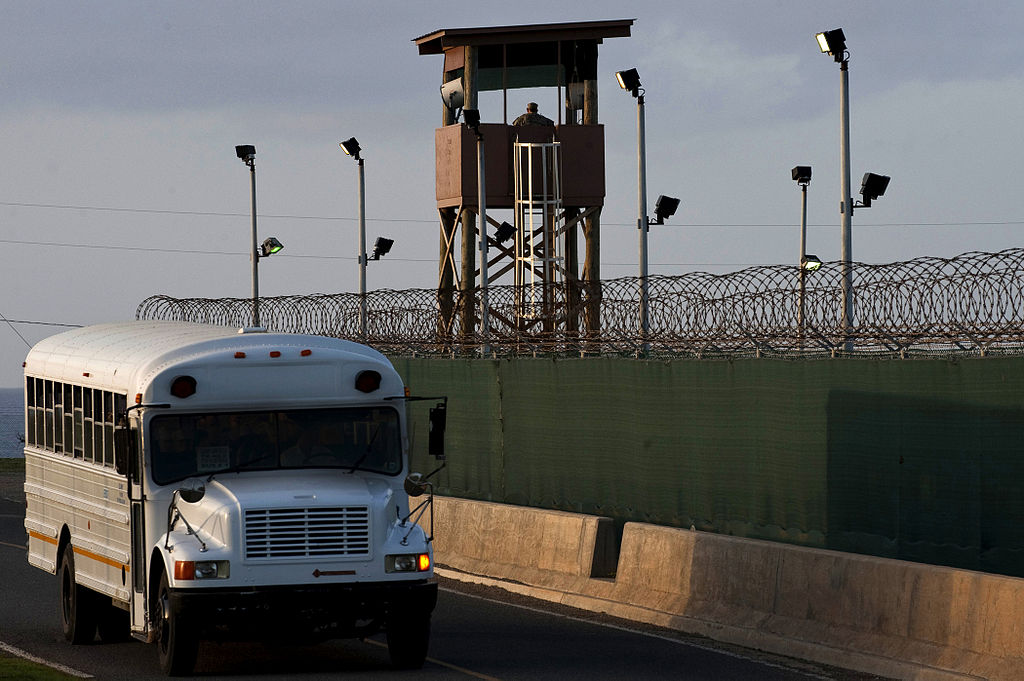Guantanamo, Certification, and the Fear of Blame
The fear of blame is a powerful motivator. As illustrated in “Power Wars” and “The Terror Presidency,” that fear can be particularly acute for officials who work in national security—no one wants to be accused of having American blood on their hands.

The fear of blame is a powerful motivator. As illustrated in “Power Wars” and “The Terror Presidency,” that fear can be particularly acute for officials who work in national security—no one wants to be accused of having American blood on their hands. In a recent Comment in the Yale Law Journal, I argue that Congress effectively weaponized this fear of blame through an obscure bureaucratic procedure—the certification requirement—to thwart one of President Obama’s key foreign policy priorities: closing Guantanamo Bay.
Certification requirements demand that an official attest to a state of affairs before a particular governmental action may be taken. Under the War Powers Resolution, for example, the president may temporarily extend the use-of-force window by certifying that “unavoidable military necessity” requires it. Certification requirements litter the landscape of American foreign affairs—a 1999 tally found them in more than 100 foreign-policy provisions. They are woven into some of America’s most high-profile national security laws, such as Section 702 of the Foreign Intelligence Surveillance Act; they are also embedded in statutes that have proven to be flashpoints for the Trump administration, such as the Iran Nuclear Review Act and Jerusalem Embassy Act.
But certification requirements have received short shrift from academics, who have largely written them off as weak checks on the executive.“When push comes to shove,” writes one, “a certification requirement will not prevent the executive branch from acting, if it believes that there are compelling reasons to do so.”
Guantanamo suggests this account is wrong.
Congress fiercely opposed President Obama’s efforts to close Guantanamo and used a variety of means to obstruct him. Certification requirements were one effective tactic. Beginning in 2010, Congress required that, prior to transferring a Guantanamo detainee to a foreign country, the defense secretary certify that the host country had taken the steps necessary to ensure that the transferee “cannot engage or re-engage in any terrorist activity.” The provision effectively made President Obama’s secretaries of defense “personally responsible for preventing recidivism.”
Understandably, none of them wanted to be on the hook for a potential terrorist attack. During his tenure, Secretary Robert Gates made no certifications. Secretary Leon Panetta did not either. “As Secretary, that provision required that I sign my life away,” Panetta said. And while Secretaries Chuck Hagel and Ash Carter eventually certified a number of transfers, it was not without significant delay and arm-twisting. “I’d get the hell beat out of me all the time on this at the White House,” Hagel said. Hagel was ultimately ousted, and the media widely reported that frustration with the pace of certifications was a cause. Because President Obama’s strategy to close Guantanamo relied upon first shrinking its prison population, detainee transfers were a vital part of the effort. The certification requirements threw sand in the gears.
Guantanamo serves as a useful case study to understand how certification requirements can be potent tools. By forcing an official to put her name on the line, certifications localize accountability for a judgment. In the context of high stakes, uncertain or unpopular decisions, this localization of accountability effectively concentrates the risk of blame. As one former defense official said of the transfer certifications: “It was basically, ‘Go ahead, I dare you.’ No secretary of defense wants his name on that piece of paper.” By harnessing this fear of blame, certification requirements can shape decision-making.
Guantanamo is not the only example of certifications influencing executive behavior. President Trump’s approach to both the Iran Deal and the Jerusalem embassy has been shaped by his reluctance to make politically damaging certifications—to repeatedly avow that the suspension of sanctions against Iran was “appropriate and proportionate,” for instance, would have undercut positions he took during the campaign.
Imposing certification requirements can also make for smart politics. After the November 2015 Paris terror attacks, House Republicans introduced the American Safe Act, a bill which would have required top national security officials to unanimously certify that each Iraqi and Syrian refugee was “not a threat” before they could be admitted to the United States. The bill would have hamstrung the Iraqi and Syrian refugee programs. Then-FBI director James Comey told lawmakers that, because there are always risks in allowing foreigners into the country, the bill would make it impossible to admit any refugees. But, because they were not explicitly ending the refugee programs, the bill’s advocates could declare their commitment to refugees even as they effectively closed the door on them. And the Obama administration, which opposed the bill, found itself on its heels—it was put in the unenviable position of having to argue against greater “accountability” in government. The White House struggled to make its case; nearly 50 House Democrats voted for the bill before it ultimately died in the Senate.
The Guantanamo transfer restrictions are proof of concept that certification requirements can be powerful. They may serve as a model for politicians who wish to constrain executive action by leveraging the fear of blame, particularly in national security matters where the risks are uncertain and there are terrible repercussions for being wrong.




